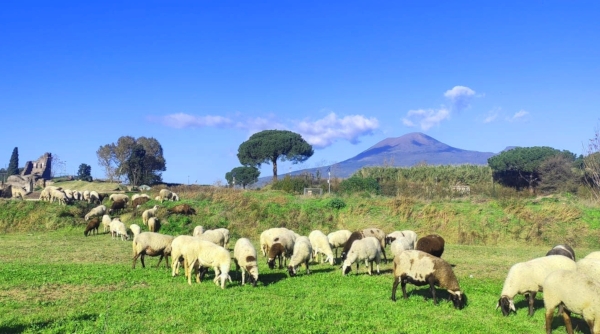ECO-GRAZINGAT POMPEII FOR THE SUSTAINABLE UPKEEP OF GREEN SPACES
150 SHEEP IN THE UNEXCAVATED PLATEAU OF THE ANCIENT CITY
A RETURN TO THE GREATEST TRADITIONAL TECHNOLOGY: “NATURE”
Savings and environmental impact
150 sheep currentlygraze in the green space within the ancient city of Pompeii in a large area that still remains unexcavated, covered above the layer of ash and lapilli by extensive vegetation which requires maintenance.
“Sometimes the most innovative solution is to return to our roots. By rediscovering the oldest and most efficient traditional technology – nature -, Pompeii can deal sustainably with the running and upkeep of the green spaces on the site,”saysGabriel Zuchtriegel, the director of the archaeological park.
An experimental nine-month agreement for eco-friendly grazingby sheep will ensure the sustainable upkeep of grassy areas, without any cost to the park authority, and fully respecting the natural features of the area, restricting the growth of weeds and providing natural fertilisation for the soil.
This alternative, highly effective method takes advantage of the capacity of herds of sheep to keep grassy areas tidy and improve also soil quality, saving money while simultaneously having a positive environmental impact. Sheep do not require nearly as much electrical energy as machinery and their presence therefore means no costs are incurredand no pollution is created. Industrially cut grass becomes a form of waste that requires disposal. Sheep, on the other hand, eat the grass they chew and recycle it, fertilising the grass which, by being enriched with organic matter and micro-organisms, is the best way to prevent flooding and drought. Pesticides are clearly superfluous.
The activities currently being carried out in the park include tending vineyards that produce wine, managing and cultivating olive groves and producing olive oil in conjunction with Unaprol and Aprol Campania, planting trees in conjunction with Arbolia (the ancient wood of Piazza Anfiteatro and near Villa di Diomede), carrying out social farming projects in which children and adolescents with disabilities and autism can pick fruit, as part of training courses designed to help young people find work (Associazione Il Tulipano), and the garden nursery devoted to Pompeian flora which grows trees and plants based on historical and archaeological evidence. The eco-grazing initiative is part of the broader project of the Azienda agricola Pompei (the Pompeii farm project) launched by the Archaeological Park of Pompeii.
This wide-ranging projectis designed to encourage the self-sufficient management of the green spaces within the archaeological areas and its aims include ensuring that these productive initiatives become a driver of local economic development which is environmentally, socially and legally sustainable.



